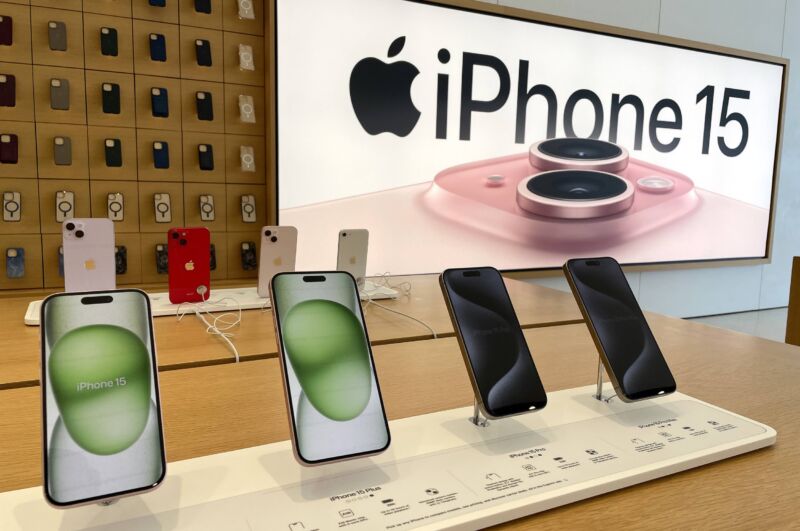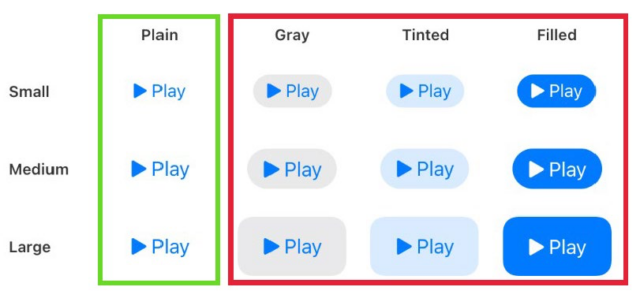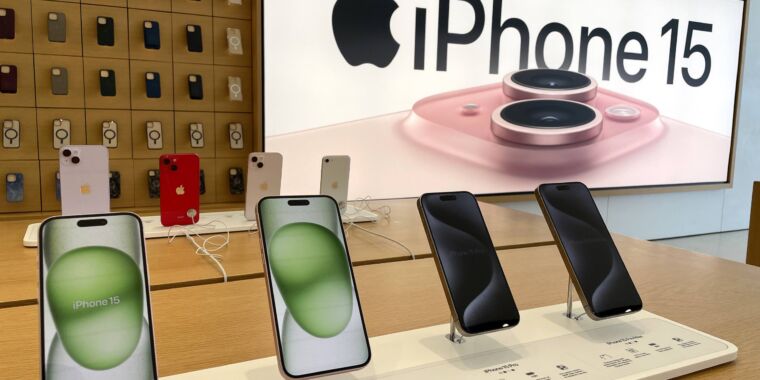Epic asks court to block Apple’s 27% commission on website purchases

Getty Images | Justin Sullivan
Epic Games yesterday urged a federal court to sanction Apple for alleged violations of an injunction that imposed restrictions on the iOS App Store. Epic cited a 27 percent commission charged by Apple on purchases completed outside the usual in-app payment system and other limits imposed on developers.
“Apple is in blatant violation of this Court’s injunction,” Epic wrote in a filing in US District Court for the Northern District of California. “Its new App Store policies continue to impose prohibitions on developers that this Court found unlawful and enjoined. Moreover, Apple’s new policies introduce new restrictions and burdens that frustrate and effectively nullify the relief the Court ordered.”
The permanent injunction issued by the court in September 2021 said that Apple may not prohibit app developers from including external links to alternate sales channels “or other calls to action that direct customers to purchasing mechanisms” that aren’t Apple’s in-app purchasing system. The injunction also said that Apple may not prohibit developers from “communicating with customers through points of contact obtained voluntarily from customers through account registration within the app.”
Epic pointed out that the iPhone maker requires developers to “pay Apple a new fee of 27% on any purchases users make outside the app up to one week after clicking a Link.” The fee alone “is enough to frustrate the very purpose of the Injunction; if Apple is allowed to tax out-of-app purchases, those purchases could never constrain Apple’s pricing of IAP [in-app purchases], and developers and consumers would not have any reason to use these alternative transacting options,” Epic said.
The case began in August 2020 when Fortnite maker Epic filed a lawsuit claiming that Apple monopolizes the iOS app distribution and in-app payment markets and was guilty of anti-competitive conduct. A federal judge determined after trial that Apple violated California’s competition laws and “that Apple’s anti-steering provisions hide critical information from consumers and illegally stifle consumer choice.”
An appeals court upheld the injunction in April 2023, and the Supreme Court decided not to take up the case. The injunction applies nationwide.
Apple: We’re complying
Apple said in a January 2024 filing that it is complying with the 2021 injunction. Apple said it now “expressly permits developers with apps on the iOS or iPadOS App Store US storefronts to include buttons or external links with calls to action within their apps that direct users to alternative, out-of-app purchasing mechanisms.” Apple also said it “does not limit developers’ ability to send out-of-app communications to users regarding alternative purchasing methods.”
Regarding the 27 percent commission, Apple said the charge “complies with the Injunction’s plain terms” and is “consistent with the Court’s rationale for upholding Apple’s other App Store policies.” Apple’s website says the commission applies to proceeds for sales “on your website after a link out.”
Epic argues that “Apple’s new scheme so pervasively taxes, regulates, restricts and burdens in-app links directing users to alternative purchasing mechanisms on a developer’s website (‘External Links’ or ‘Links’) as to make them entirely useless. Moreover, Apple continues to completely prohibit the use of ‘buttons… or other calls to action’ in direct contravention of this Court’s Injunction.”
Epic argues that the “plain button style” required by Apple “is not a button at all.” Epic provided this illustration, saying the only allowed button types are the ones in the green box:

The original version of that illustration comes from Apple’s website. On another page, Apple says that external purchase links must use the plain button style.
“With these new policies, Apple continues to charge unjustified fees and intentionally prevent the ‘open flow of information,'” Epic said. “Apple’s goal is clear: to prevent purchasing alternatives from constraining the supracompetitive fees it collects on purchases of digital goods and services. Apple’s so-called compliance is a sham.”
Epic asks court to block Apple’s 27% commission on website purchases Read More »
